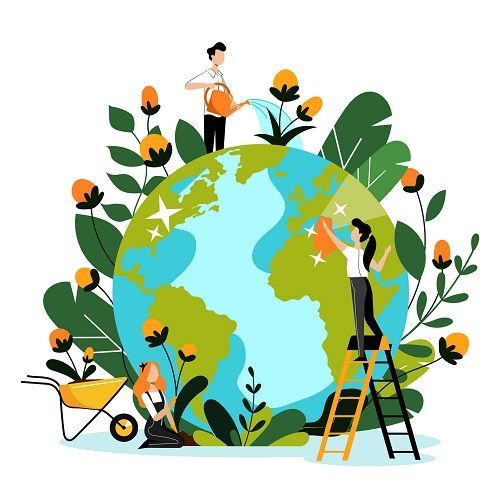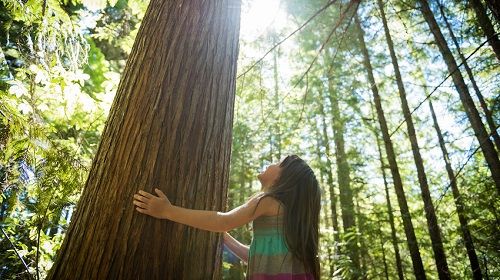The Psychadelic Connection with The Natural World
New research shows how magic mushrooms, LSD, and other psychedelics can build connections between individuals and the environment through nature-relatedness.
Human Dissociation with Nature
For some, the birds and the bees are as far as their connection with nature goes. Once upon a time man and nature were one. The sun was our clock, waterfalls our shower, and the stars our nightlights. As industrial and technological advancements continue to grow, the further as a society we dissociate with nature. This can be detrimental not only to individuals’ mental health but to the environment’s biosphere. Of course, those who live in rural areas or vacation with Mother Nature often may be less exposed to this disconnection. Human dissociation with nature is a greater threat in urban areas. Often metropolitan regions lack natural green space and opportunities for people to connect with the environment. Despite this, urbanization is on the rise globally which can lead to a continual increase in disconnection from nature.
How does this pollution affect people?
Issues such as air pollution, climate change, water pollution, and natural resource distribution are the major crises our environment faces. According to the water pollution statistics from 2021, over 2.5 million acres of ponds, reservoirs, and lakes in the United States alone are unsafe due to nutrient pollution. Exposure to high levels of air pollution can cause a variety of health issues. Primary concerns involve the increased risk of respiratory infections, heart disease, and lung cancer. And that is not the only threat. The World Health Organization reports climate change poses a health threat through the jeopardy of clean air, safe drinking water, sufficient food, and secure shelter. It estimates between 2030 and 2050, climate change is expected to cause approximately 250,000 additional deaths per year, from malnutrition, malaria, diarrhea, and heat stress.
As earth dwellers, we have a responsibility to take care of our homes. At the minimum not destroy it. Building a relationship with the environment sparks the behavioral changes needed to make environmentally-friendly decisions, benefiting everyone long term.
Nature Connectedness: Consciousness and The Environment

Nature connectedness also known as nature relatedness is one’s direct and emotional relationship with Mother Earth. It measures one’s self-identification with nature and experiential sense of oneness with the natural world. The concept is not to be mixed up with nature exposure or immersion. That refers to direct physical and/or sensory contact with the natural environment, like gardening or swimming. Although increased nature exposure does grow one's relatedness to the environment.
Decades of dedicated research have found strong correlations between heightened levels of nature-relatedness and reduced levels of anxiety, psychological well-being, greater life meaning, and even happiness. It is a mutualistic relationship where both parties benefit. And one way to better your relationship with Mother Earth is through psychedelics.
Psychedelic Renaissance: Change in the World Plant Medicine

From fungi straight out of the soil to LSD synthesized by a science genius, psychedelics create new stages of consciousness in those who dare to indulge. Once stigmatized as a party drug, advocates are dismantling such beliefs about psychedelics. Research links the main active ingredient in psychedelics, psilocybin, to treatment for depression, migraines, nicotine addiction, and alcohol addiction. Concept engineers even developed an app that mimics the use of psychedelics to acquire its medical and psychological benefits. As psychedelics increase in popularity and research verifies these benefits aren’t just in our heads, it is hard to deduce the power of psilocybin to simply better dance moves.
Swiss chemist Albert Hofmann, the first person to synthesize LSD, believed that the drug made individuals “aware of the wonder of creation, the magnificence of nature and of the animal and plant kingdom.” After using psychedelics, he accounts for personal experiences, claiming, “I became very sensitive to what will happen to all this and all of us.”
I can relate to Dr. Hofmann. Using magic mushrooms, the blue sky was brighter, the sun was shinier, and I was more aware of the wind on my skin. Such occurrences were a reminder that the earth was living. Mother Nature was providing immensely for me, and once I was conscious of such, it was hard to remain idle.
Psychedelic Drugs and Nature Relatedness
That’s why environmental attitudes can be resistant to change. Feelings of connectedness with nature are a primary facet of the psychedelic experience. One study demonstrated that psychedelics created pro-environmental behaviors in participants because they felt a connection with nature. Another recorded nature-relatedness in participants remained significantly increased after dosing.
As amazing as it sounds, a single dose of psilocybin was reported to increase mindfulness up to 3 months later. An important factor as mindfulness is linked to heightened nature connectedness. One recent study recorded an increased nature-relatedness up to 2 years after psychedelic use. This is evidence that psychedelics do not need to be consumed on a regular basis to evoke change. Environmentally-friendly behavior might be the best habit to pick up.
The list goes on about the link between psychedelic experience and increased connectivity with nature. A substantial amount of literature and research provide evidence of their correlation. But why should you care psychedelics makes you fall in love with nature? The goal is to grow nature connectedness to propel individuals into an environmentally conscious lifestyle. That consciousness prompts behavioral changes that won’t contribute to air pollution, climate change, and water pollution. One’s mindset is a key factor in solving existential crises. The 26th annual United Nations Climate Change Conference (COP26) harped on the power of optimism to combat the climate crisis. So don’t disregard any tree-huggers yet; they might be onto something.

Ego Dissolution
High nature relatedness has elicited higher valuations of intrinsics like personal growth, intimacy, and community. The psychedelic experience is a distortion of an individual’s self or “ego.” There are several names for this concept. This silencing of the ego allows the individual to be in tune with their surroundings.
The science does not say for sure if psilocybin causes ego-dissolution, leading to heightened nature connectedness or if the increase in environmental relatedness is a direct relation of the active ingredient. More research is needed to draw clear cut lines, but results conclude that the correlations are present at a minimum.
Effects of Nature Relatedness on Psychological Health
A happier relationship with Mother Nature doesn’t just help the environment but people too. Connecting to nature provokes positive environmental behavior, but it also increases psychological well-being. When humans interact with nature, there is a physiological and psychological stress reduction, decreased rumination (repetitive negative thoughts), and restorative effects on cognitive functioning. Nature can be mental health medicine.
The global environmental challenges we confront can be attributed to a rising alienation and isolation from nature. Tripping off psychedelics and frolicking in a daisy field may not refreeze ice caps or suck pollution particles out of the air. However, bonding humans with nature and recognizing methods of reversing our disconnection must be regarded as a shared objective and the primary concern. So eat a magic mushroom and hug a tree. Don’t forget to let Mother Nature hug you back.
What are some other good ways to feel our "interconnectedness"?

On days when psychedelics do not fit into your schedule, there are alternative ways to connect with nature. A great way to build that interconnectedness is through natural exposure or immersion. This is when all your senses are stimulated by the environment. So wake up and smell the roses. Forget your umbrella and feel the rain. Stop and listen to the birds or the wind. Gaze up at the sky or down at intricate cracks in the soil. Help yourself to a serving of Mother Nature’s edible leaves and berries. The key to connecting with nature is being present.
If you rather be on house arrest than out in nature, it may help to ease your way into a relationship with the environment. You can build a connection with nature through art, stories, and sound recordings. Even eating fresh foods or driving through the countryside are methods that expose you to the environment without full immersion. Still, these simple tasks promote nature-relatedness and in turn prompt environmentally-friendly behavior.
Learn more about plant medicine and the climate crisis:
For more information on plant medicine and the environment stayed tuned to Honeysuckles’ psychedelics and climate crisis verticals.


